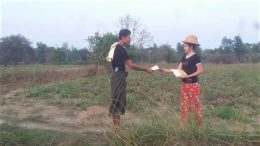Since the first case of COVID-19 in Myanmar, the government took proactive measures to slow down the spread of COVID-19 in the country including increased health checks along the border with China, suspension of Visa on Arrival for Chinese nationals, temporary shutdown of wet markets and animal feed factories. Travel and movement restrictions were also imposed. The disruption in logistics and transport systems and tightened restrictions on cross-border flows resulted in disruptions in agriculture and food supply. Supply chain disruptions resulted in market losses and increased costs of inputs for smallholder farmers. Therefore, there was a need to urgently support and subsidize the farmers.
To address the economic challenges posed by COVID-19, the Government of Myanmar requested emergency financial assistance to fund the government’s economic relief plan. IMF approved the amount of USD 356.5 million for this. On 26 June 2020, the World Bank also approved a USD 200 million credit from the International Development Association to increase agricultural productivity and enhance market access for Myanmar.
The government has disbursed a total of MMK 101 billion (Myanmar Kyats) to businesses and almost three-quarters of the COVID-19 budget has been distributed to SMEs. On 3 July 2020, the government announced to add MMK 100 billion to its COVID-19 fund, which will be allotted to the country’s agriculture and livestock sectors.
AFFM Response to COVID-19
As an initial response, the Agriculture and Farmer Federation of Myanmar (AFFM), the national implementing agency of AFOSP-APFP in Myanmar, distributed to their farmer members leaflets containing information on how to avoid contracting COVID-19. It is important to inform farmers about the risks of the virus as most of them continue to work in open spaces to provide food for themselves and the community.
Food packs for locked down farmers in Chin State
In March, the village of Kaptel, Tedim township, Chin State was placed on lockdown because of a confirmed case of COVID-19. February and March are the planting season for corn, rice, and beans, but under the lockdown, farmworkers are not allowed to go to their farms. There are 40 farmer members of the AFFM in this village. Understanding the difficulty that they are into, AFFM though AFOSP-APFP, provided them with basic food packs consisting of rice, oil and dal, and soap good for 15 days to help them through this crisis.
The farmers were unable to sell their products as there were no market outlets and they cannot afford storage facilities to store their unsold produce. These challenges added to their suffering to the point that they could barely maintain their livelihood. To help the farmers, AFFM came up with an idea to develop a marketing/enterprise initiative in collaboration with their parent organization CTUM. This way, they can contribute to addressing the unstable market of their FO members’ agriculture produce while helping reduce poverty amongst their union members.
Moroever, AFFM keeps productive in providing good agricultural practice (GAP) training and business planning
New Normal, New Business
On 21 June 2020, AFFM with the help of Asiadhrra Project – FFPopened a Union Mart located at Hlaing Tharyar Industrial Zone where the majority of trade union members are working. This project provided a direct link between farmers and urban consumers, mostly from the low-income groups by establishing a product center named Union Mart. In the initial stage, 12 items have been picked for selling which would cater to the most basic needs of the consumers. potatoes, onions, sunflower seeds, tea leaves, rice, and other kitchen that produced by the farmers union members. The price quoted for the goods is lower by 50-100 MMK (USD 0.37) compared to the usual market price.
[1] https://www.worldbank.org/en/country/myanmar/publication/myanmar-economic-monitor-june-2020-myanmar-in-the-time-of-covid-19
[2] https://www.mmtimes.com/news/myanmar-commits-imf-funding-pandemic-persists.html





Comments are closed